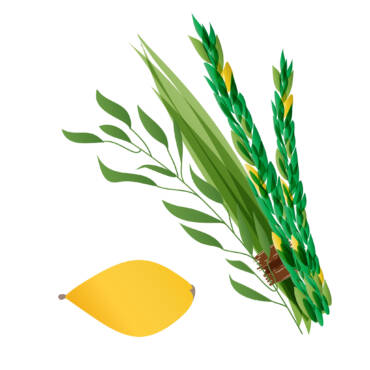Winter Fruit
We don’t often think of winter as a season for bearing fruit. Yet the Scriptures encourage us that fruitfulness is not based upon times and seasons, but rather in season and out, we’re to be producing the spiritual fruit of the life of Yeshua. For praise is “the fruit of the lips” (Heb 13:15), and practice is “the fruit of righteousness.” (Heb 12:11) This fruitfulness is not based on a season, but is developed by abiding in Yeshua (Jn 15:5). A winter holiday called Tu B’Shevat reminds us of this type of fruit.
Tu B’Shevat is a minor Jewish holiday (meaning it’s still a work day), and is one of four Rosh HaShanas’ (“New Years'”) mentioned in the early Jewish writings (the Mishna). Tu B’Shevat is the “new year for trees“. The name, Tu B’Shevat, comes from the date of the holiday, the 15th day of the Hebrew month of Shevat. This year it will be celebrated on February 4th.
In the second Temple period, Tu B’Shevat was originally a day when the fruits that grew from that day on were counted for the following year regarding tithes (Mishnah, Rosh HaShana 1:1; Talmud Rosh HaShana 2a, 14a).
Influenced by these early Jewish writings, people in the Middle Ages started to celebrate Tu B’Shevat with a minor ceremony of eating fruits. In modern times, Tu B’Shevat has become popular with many Jews (some think of it as Jewish Arbor Day). It is now customary to eat different types of fruit and nuts on this holiday.
Traditionally, these types of fruit are associated with the Land of Israel in the Hebrew Bible. These fruits include: grapes, dates, figs, olives, and pomegranates. There are also other types of fruit and nuts included: oranges, bananas, walnuts, and pistachios (which have inedible exteriors and soft edible insides); dates, apricots, olives and persimmons (which have soft exteriors, but a hard pit inside); and figs and berries (which are eaten whole).
Though this may not mean much to some, we can learn spiritual truths from these four categories of Tu B’Shevat foods, as we as talmidim (disciples) develop spiritual fruit in Messiah:
1. Fruits and nuts with hard, inedible exteriors and soft edible insides:
What a vivid reminder of our spiritual life in Messiah! While we are in this world, we often need to be “hard on the outside,” so to be resistant to sin and “not conformed” to the influences of the world (Rom 12:2). This is why the Scriptures often teach us to “resist the devil” (James 4:7; Eph 6:13; 1 Peter 5:7-9). On the other hand, since “greater is He who in us than He who is in the world” (1 Jn 4:4), we need to be soft on the inside, that is, yielded and responsive to the Holy Spirit while being resistant to the unholy spirit. This is not natural, but is a matter to grow into through discipleship. We must learn to resist the devil, mortify our flesh, and repel the world’s teachings, while all the time yielding to the Spirit’s promptings and His still small voice that guides us to love our enemy, and bless those who curse us.
2. Fruits and nuts with soft exteriors, but with a hard pit inside:
Here we have another illustration of our mature walk in Messiah. The soft exteriors remind us how we need to be loving to all, yet have a “hard pit inside.” We’re not to be hard hearted, but rather uncompromising in the absolutes of the eternal Word of God. This gives us the internal character of righteous integrity and an iron backbone to withstand the wayward winds of this world. How easy for our merciful “soft exterior” to be offended and hurt by the unkindness of this world’s system! Yes, our internal responses to the world’s attack of our testimony in Messiah can make “the love of many grow cold” (Mat 24:12). This is why we need a “hard pit;” not a cold, hardened heart, but a heart firm in faith of His unchanging love in Yeshua. No matter how others may hate us, they cannot stop us from loving them! This is also not natural, and must be addressed in discipleship. We need to be taught the absolutes of the Word of God; the primary matters of our faith, and learn to distinguish between what is essential and what is non-essential (Mat 23:23). We need to learn how to give liberty on what is secondary, but remain unflinching on what is primary to the faith.
3. Fruit that is eaten whole:
As we mature, we enjoy all of His Word. New believers may think some portions of God’s Word are difficult to digest (Jn 6:60). But as we press on in His eternal Word, we recognize that “solid food is for the mature” (Heb 5:14), and that “all Scripture is both inspired and profitable” (2 Tim 3:16). As we mature in Messiah’s truth and, therefore, walk in the truth, may every area of our life bring “praise to His glory” (Eph 1:6,12,14). As the Passover Lamb was eaten whole and unbroken (Exodus 12:8-9, 46; John 19:36), so “the Scripture cannot be broken” (Jn 10:35), for the truth of the written Word reveals the truth of the Living Word. This too is not natural and is a discipleship matter. Without straightforward discipleship, believers will rationalize the Scriptures and act like the Bible is “trail mix,” picking out only what they like, and falling into immorality and rebellion.
4. Fruit that is associated with Israel:
Maturity sees fruit that becomes less concerned with our personal agendas and more concerned with God’s eternal agenda. Maturity for both Jewish and Gentile believers will further reflect the concern that the apostle to the Gentiles taught regarding the ministry of prayer: “My heart’s desire and prayer to God for Israel is that they might be saved” (Romans 10:1). This will become our own heart’s desire as we grow to become people after God’s own heart, like David who taught us to “Pray for the peace of Jerusalem” (Ps 122:6). This is strategic in God’s redemptive plan, as the Second Coming is tied to Israel’s national repentance toward God and faith in Yeshua. For Messiah said of Jerusalem, “You shall not see me again until you say, ‘Blessed is He that comes in the name of the Lord” (Mat 23:37, 39). May our maturity in Messiah reflect the heart of the King of the Jews in having fruit associated with Israel! This as well is not natural and is a matter for discipleship. Many will associate with Israel for chauvinistic reasons, sympathetic reasons, or for many personal reasons. However, we must disciple people in the biblical calling of God upon all believers to pray for the salvation of Israel, and to make Israel desirous for the Messiah. The testimony of God’s faithfulness is at stake, and only solid discipleship will testify that Yeshua is God’s faithfulness to Israel and also to the nations.
So, this year, may we all mature as His talmidim and bear fruit that testifies of the God of Israel’s love, fully and forever received in the Jewish Messiah and Savior of the world, the Lord Yeshua.
Remember, too, there is fruit of which we’re not to eat at all, nor with which are we to be identified:
- The “Fruit of the tree of the knowledge of good and evil” (Genesis 2:17): Discernment between good and evil is found as a result of following God’s Word (Heb 5:14), not by disobeying His Word.
- “First fruits” are for the house of the Lord (Ex 23:19; 34:26; Leviticus 2:12; 23:10; Numbers 18:12, 13; 28:26; Deuteronomy 18:4; Nehemiah 10:35-37): All first fruits are for God’s use only. And as His first fruits (Jacob 1:17-18), we are for His use only, not for common use.
- “Fallen fruit” are “for the needy and the stranger“:(Lev 19:10). By providence we don’t get all we have planted so that others too can be blessed. Do not be misers, hoarding and keeping; remember, it is “more blessed to give than to receive” (Act 20:35).
- “Immature fruit” remains uneaten for three years; in the 4th year, the fruit is for God; and only in the 5th year can you partake (Lev 19:23-25). Paul uses this as a picture of a young believer who should not be placed into eldership; he is a neophyte – a new plant (1 Tim 3:6). We “eat” from those mature in the faith, who have first given their first fruits to the Lord.
- “Bitter fruit” – “poisonous and wormwood” (Dt 29:18-20), is that which is the fruit of the disobedient and rebellious; none of which edifies the child of God. Do not give ear to the non-believer who mocks the faith and denies the Lord (Titus 1:14); for the fruit of the arrogant are under God’s judgment (Isa 10:12; Jeremiah 6:19). Never partake of what God has said is wrong. But of what man says is wrong, God may at times command us to partake (Acts 10).
- “The fruit of lies” (Hosea 10:13) is a result of wickedness, and becomes deception and destruction to the eater. Many countries have such propaganda; beware of becoming merely a symptom of the problem and not an instrument of the solution.
- “Unknown fruit” can be poisonous, and you can be poisoned unawares (2 Kings 4:39-41). Beware of what you partake, for the enemy is subtle and can camouflage evil teaching with religious words (2 Jn 1:9).
- “The fruit of the tongue of death,” spoken by those who love death, cannot be words of life (Pro 18:21). These are the “sinful passions” that “bear fruit for death” (Rom 7:5), for those who live under the jurisdiction of the Torah of Moses are merely having their flesh aroused, and bad fruit is produced. Do not partake of the fruit of legalists, but only of the fruit of “grace” (Heb 13:9).
- “Stolen fruit” is considered ‘good enough’ by those who do not serve God from a whole heart (Mal 1:12-13). If it’s unworthy for the Lord, it is also unworthy for His people who eat in fellowship with Him. Beware of this fruit, for the excitement of sin can make it it seem even sweeter (Prov 9:17).
- The “rotten figs” (Jer 24:2-10). Beware of that fruit which resists the will of God and doesn’t yield in accepting chastening from the Lord. It is not wisdom to resist the Lord’s discipline. For He disciplines us only as His sons and no longer as sinners (Heb 12:5-6). We are called to accept discipline that we might bear “‘the peaceful fruit of righteousness.” (Heb 12:7-11).
- “Bad fruit” ( Mat 7:15-20) is not to be eaten, but rather identifies false teachers, wolves in sheep’s clothing, who are without righteous fruit.
- “Fruitless discussion,” by so called teachers of the Torah (1 Tim 1:6-7), whose arrogance conceals their ignorance of the very Torah they claim to teach, is to be avoided.
And though it’s not fruit, per se…
- “Do not eat food sacrificed to idols” (1 Cor 10:28), for though “we are neither the worse if we do not eat, nor the better if we do eat,” (1 Cor 8:8) but we refrain so as to edify the least, evangelize the lost, and exalt the Lord.” Love limits liberty, for we partake of nothing that will stumble a weak believer, hinder the Good News, or do dishonor the Lord.




Add Comment